Our Presbyterian Beliefs written by the Rev. Dr. Douglass Key
Bowling Green Presbyterians believe that...
We are a people of God in the world, called together by the Holy Spirit through the Scripture to be servants of God and all the people of God. We believe that Jesus Christ is the head of our church and that the Holy Spirit guides us to further God's kingdom here. We are a congregation of the Presbyterian Church (USA,) the Synod of the South Atlantic, and Providence Presbytery.
Why is Grace so Important?
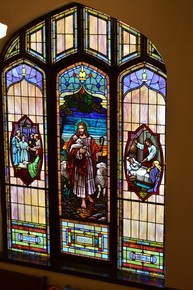
We cannot save ourselves. Our sin has alienated us from God in ways that make that relationship impossible for us to reconcile. There is nothing we can offer God, no words we can say to God, no life of charity and goodness that we can live for God, no bargain we can strike with God, that will compensate God for the damage that our brokenness has done to the glory he inscribed on our hearts and lives in our creation. We are too fallen to save ourselves.
The only hope that we have is that God will decide to restore us. Not because we are proved worthy, but because it is in God's nature to seek the lost and redeem the enslaved. The only hope that sinners can cling to is that God will be graceful and welcome even us, use even us, save even us from the consequences of our wayward and reckless lives.
It all depends on grace. The grace of God that welcomes the Prodigal home, that heals the leper, that restores sight to the blind and hope to the forsaken.
In Jesus Christ, God declares himself to be forever graceful, merciful and compassionate. His grace, his unmerited acceptance of us into his kingdom, makes it possible for our lives to have meaning, to contribute something substantial to the establishment of his rule among us.
The only hope that we have is that God will decide to restore us. Not because we are proved worthy, but because it is in God's nature to seek the lost and redeem the enslaved. The only hope that sinners can cling to is that God will be graceful and welcome even us, use even us, save even us from the consequences of our wayward and reckless lives.
It all depends on grace. The grace of God that welcomes the Prodigal home, that heals the leper, that restores sight to the blind and hope to the forsaken.
In Jesus Christ, God declares himself to be forever graceful, merciful and compassionate. His grace, his unmerited acceptance of us into his kingdom, makes it possible for our lives to have meaning, to contribute something substantial to the establishment of his rule among us.
Why do Presbyterians baptize infants?

In the Presbyterian Church we recognize two ceremonies that are explicitly sacramental. By sacramental we mean rituals that were established by Jesus himself and that demonstrate the nature of God's love and mercy for the world. Those two sacraments are Baptism and the Lord's Supper. In these two acts God's character is revealed to us, and we are really in God's presence in ways that are unusual and extraordinary. God is really present at the font and table in ways that God is not ordinarily present to us.
Jesus' death on the cross is the atoning sacrifice that reconciles sinful humanity to the God who created, redeems and sustains its life. Jesus' death on the cross is sufficient and necessary. It is where God's great love for the world is most clearly demonstrated.
In Baptism we claim God's great love for the world as God's saving and sustaining love for us. Because the love that saves and sustains us is God's love, and not our love for God, it precedes and exceeds any love for God that even our most holy saints might attain. In baptizing infants into that love and that life we are claiming God's love for them which precedes their capacity to comprehend it, and will ever exceed their capacity to respond to it. We are marking them as God's beloved, and promising to raise them into an understanding of that love which will nurture their trust in that love their whole lives long.
Jesus' death on the cross is the atoning sacrifice that reconciles sinful humanity to the God who created, redeems and sustains its life. Jesus' death on the cross is sufficient and necessary. It is where God's great love for the world is most clearly demonstrated.
In Baptism we claim God's great love for the world as God's saving and sustaining love for us. Because the love that saves and sustains us is God's love, and not our love for God, it precedes and exceeds any love for God that even our most holy saints might attain. In baptizing infants into that love and that life we are claiming God's love for them which precedes their capacity to comprehend it, and will ever exceed their capacity to respond to it. We are marking them as God's beloved, and promising to raise them into an understanding of that love which will nurture their trust in that love their whole lives long.
Are Presbyterians Really Saved?
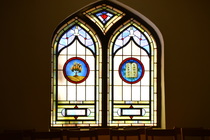
Yes, Jesus died on the cross to save Presbyterians just like everyone else. With the Apostle Peter, we believe that God shows no partiality. (Acts 10) What God accomplished on the cross, he did for all people. Nothing can be added to Christ's sacrifice. It is sufficient to cover the sins of all humanity. No additional offering is needed to complete what Christ has already done for us. We were saved when Christ saved us. On the cross.
That moment when we understand and accept Christ's saving act on our behalf is deeply significant for our lives. Our best life is lived in the knowledge of God's love for us in Christ. Salvation ransoms us from self-centered and futile pursuits. In that moment, we are filled with a peace and trust in the love of God that sets us free to live for others. We become new people and are sent into the world to bear witness to the unconditional love of God for all.
But that moment, that knowledge, that confession, does not save us. We are saved by Christ--and specifically, by what Christ did for us on the cross that covered the cost of our sinful lives.
That moment when we understand and accept Christ's saving act on our behalf is deeply significant for our lives. Our best life is lived in the knowledge of God's love for us in Christ. Salvation ransoms us from self-centered and futile pursuits. In that moment, we are filled with a peace and trust in the love of God that sets us free to live for others. We become new people and are sent into the world to bear witness to the unconditional love of God for all.
But that moment, that knowledge, that confession, does not save us. We are saved by Christ--and specifically, by what Christ did for us on the cross that covered the cost of our sinful lives.
Who Is Welcome at the Lord's Table?
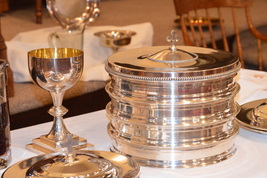
At the Lord's Supper ,we are received into the presence of our Risen Lord who offers us the redeeming power of his crucified life as sustenance for our life of faith. We come to the table to be nourished for the trials and challenges of faithful living. It is the Lord's Table. Christ invites all those who trust in him, who rely upon the sacrifice symbolized in that bread and cup for life, all those who are baptized into his death and claimed by his broken body and shed blood to take from his hand these gifts that anticipate the banquet that we all will share in the kingdom of his glory.
We invite and welcome all Baptized Christians to commune with us at the table of Lord
We invite and welcome all Baptized Christians to commune with us at the table of Lord
What are Elders and What do they do?
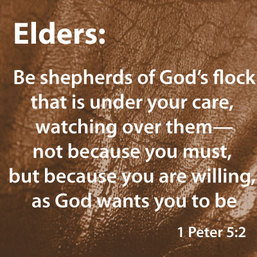
Presbyterians believe the basic form of ministry is the ministry of the whole people of God, from whose midst some are called to ordered ministries to fulfill particular functions. Further, the Church's ordered ministries described in the New Testament and maintained by this church are presbyters (teaching elders and ruling elders).
Ruling Elders in service on the Session are the governing body of the congregation. They are charged with ministries of discernment and governance. They are responsible for the life and ministry, the program and staff of the congregation. Ruling Elders establish the budget and set the missional priorities for the congregation's life.
Teaching Elders (Pastors and Associate Pastors) serve on the session of the congregation where they are installed.
Both men and women alike are called and elected to the offices of Teaching Elder and Ruling Elder in the Presbyterian Church. In higher councils of the church: Presbytery, Synod and General Assembly, equal numbers of Ruling and Teaching Elders are commissioned as voting members.
Ruling Elders in service on the Session are the governing body of the congregation. They are charged with ministries of discernment and governance. They are responsible for the life and ministry, the program and staff of the congregation. Ruling Elders establish the budget and set the missional priorities for the congregation's life.
Teaching Elders (Pastors and Associate Pastors) serve on the session of the congregation where they are installed.
Both men and women alike are called and elected to the offices of Teaching Elder and Ruling Elder in the Presbyterian Church. In higher councils of the church: Presbytery, Synod and General Assembly, equal numbers of Ruling and Teaching Elders are commissioned as voting members.
What do Presbyterians believe about the Bible?
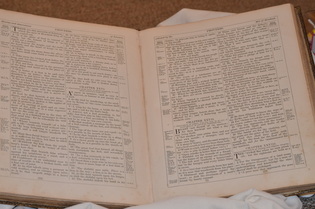
The holy scripture of the Old and New Testaments is the Living Word of the Living God. For us at the Bowling Green Presbyterian Church the Bible is our chief guide for faith and life. All other standards that govern our life together or that inform our faith are subordinate to the witness of scripture. Whatever we might think we know about God from our experience or our common sense must be entirely consistent with what know to be true about God from scripture.
The Bible forms us into the witnesses to the Gospel that God has called us to be. It defines the contours of our community such that the life of our congregation testifies to the love of God for the world in Jesus Christ. Everything that we do and that we are--the way we worship, the way we love one another, the way we study and serve-- is grounded in our knowledge of God in the Bible.
We dwell deeply and richly in the Word. The Bible is a resilient text that withstands any question we might ask of it, that blesses any heart that struggles with it. When we take the time to read it, when we truly open our hearts to the transforming power of its word, we are always nurtured and fortified in faith. When we understand it right, the Bible always leads us toward God, always draws us toward blessedness, always encourages holiness.
But such a reading more often than not challenges us. It does not leave us where it finds us but moves us to a new place, an uncomfortable place, a more charitable and generous place. We trust the Bible enough to allow it to change us, to transform us, to redefine us according to the expansive and inclusive love of God for the world in Jesus Christ.
The Bible forms us into the witnesses to the Gospel that God has called us to be. It defines the contours of our community such that the life of our congregation testifies to the love of God for the world in Jesus Christ. Everything that we do and that we are--the way we worship, the way we love one another, the way we study and serve-- is grounded in our knowledge of God in the Bible.
We dwell deeply and richly in the Word. The Bible is a resilient text that withstands any question we might ask of it, that blesses any heart that struggles with it. When we take the time to read it, when we truly open our hearts to the transforming power of its word, we are always nurtured and fortified in faith. When we understand it right, the Bible always leads us toward God, always draws us toward blessedness, always encourages holiness.
But such a reading more often than not challenges us. It does not leave us where it finds us but moves us to a new place, an uncomfortable place, a more charitable and generous place. We trust the Bible enough to allow it to change us, to transform us, to redefine us according to the expansive and inclusive love of God for the world in Jesus Christ.
